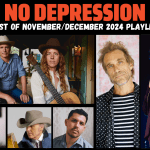On there being no such thing as “old people music”
I’m 32, which is really neither here nor there.
I’m old enough to rent a car, own a home, adopt a child, and hold public office. I have three or four grey hairs. I’m old enough to know I don’t know much of anything about anything at all, but too young to be able to call that “wisdom.”
In the world in which I operate – this roots/whatever music world – however, I tend to be on the green end of things. I’ve been around this community long enough to have gotten the hang of being one of the few under a certain age, at some of the shows I attend. And yet, outside of the work I do, I know very few folks under the age of 45 who wouldn’t consider this kind of music to be their preferred source of aural entertainment. They just tend not to go to festivals (usually because the ticket price is too high, and they’re all saving for that home purchase or that child adoption, or that run for office).
Before any 30-somethings pop on here and call this post hogwash, I will recognize there are others like me. Just not as many as there are at the indie rock or hip-hop shows. And, there are exceptions.
Last month, I went on the Cayamo music cruise, where the audience was decidedly younger than many of the festivals I attend. In fact, one afternoon, an older woman asked what exactly drew me to the cruise. The lineup, in her estimation, seemed more full of “old people music,” and she was wondering who the young people on the boat had come to see. I presumed many were drawn by Brandi Carlile – the youngest headliner on the ship. But, I also asserted I was excited about seeing Emmylou, Steve Earle, and Buddy Miller. She was perplexed by this and wanted to know how a young person like me becomes familiar with someone like Buddy Miller.
I get that a lot. I don’t entirely understand. Music is, after all, a thing which transcends age, race, religion, sexual orientation, etc. I learn about new music chiefly from this site, from friends, from musicians, and from the opening acts at shows I go to. (Also from press releases and review copies which find their way to my inbox, but that’s beside the point.) There was a time when I wasn’t a critic, during which I spent far more time at clubs and festivals, making “old people music,” than I do now. Perhaps I’m an anachronism. But I don’t think so.
At any rate, a day or two later, I found myself sitting with Carlile in the press room, and couldn’t help but ask her opinion on the conversation I’d recently had about “old people music.”
—
KR: Do you have any thoughts about why that is, or why there’s that perception that this music is more palatable to older people?
BC: I don’t know…maybe because I’m young, but age lines are blurred to me. I don’t see it. When I meet an older person or an older artist, I always expect them to see me as ageless. I don’t know why. It’s part of my identity. I don’t ever notice that age difference, although I have a tremendous respect for my elders.
I think the reason there are young people on this boat is because the young people who are playing on this boat – me, Katie, Gregory, Rachel, Ben, Shawn Mullins – our influences are Emmylou Harris, John Hiatt, Lyle Lovett, Steve Earle. That’s who influenced us to write songs. We don’t see them as the old guard; we see them as our inspiration. Because we’re inspired by them, we’re drawn to this cruise. And, because we’re drawn to this cruise, maybe younger people are drawn to this cruise. Hopefully they can see how valuable all these artists are.
—
I’d agree.
Of course, I come from the folk world, where there are many misconceptions about what, exactly, folk music is. There’s a certain demographic for whom American folk music started and stopped somewhere between the Weavers and ended somewhere in the mid-’60s. This is slightly small-minded, since Pete Seeger and Lee Hays’ perhaps more important project preceding the Weavers was the Almanac Singers, whose trail of crumbs can easily be traced via Alan Lomax and Bess Lomax-Hawes to their father, the great musicologist John Lomax, and the collection of songs which became called “folk music.” Moving in the opposite direction, the evolution of contemporary folk music didn’t hang entirely on Dylan’s shoulders (and so didn’t fall into irrelevancy when he shirked the “folksinger” categorization and brought a rock band to Newport ’65).
A very slight amount of prodding could lead one to the still-popular string band movement, and straight-up troubadour folksingers by the thousands, many of whom (though not all) are younger than Carlile.
Not to float too far off-topic, but there’s also the precarious presumption that political and topical music is lost on my generation, though I’d beg to differ on that point as well. In fact, I found myself agreeing quite a bit with an assertion Steve Earle (one of the older folks on the cruise) made during our interview, when I asked him about the political nature of songwriting. He said:
I think, especially in the United States, making art for the sake of art is a political statement. It’s a hard thing to do. We discourage it. We discourage our children from doing things where they don’t make money and aren’t guaranteed a certain income. People in this culture become doctors for the wrong reasons by the same token. Being a doctor should be a calling, not because you’re trying to see a certain number of zeros at the end of your paycheck.
I could go on, but that would be beside the point.
The point, of course, is that there’s no such thing as “old people music.” Just as there’s no such thing as old people movies or books or paintings… this is not a way the brain operates. Like speaks to like, yes, but we all seek ideas from a number of sources and directions. Music (and the arts in general) is an essential part of society just like storytelling is essential – it’s one of the ways we best learn from others. Not only does it provide us with moral options, but it allows us to check in with the rest of humanity, to be reminded that we’re not the only ones who experience the thoughts and feelings we encounter. Etc. That’s not an age-specific truth; it’s a human one.
At any rate, it’s raining here, which is perhaps why I’m ruminating on the meanings of things. I’m not sure I’ve reached a conclusion with this post, or even made a fully-formed point. But I’m interested in what this community thinks about its own demographic, or even if it believes there is one. Doesn’t the internet, in and of itself, presuppose its users are every age and color? Or have my thoughts taken me too far this rainy spring afternoon?




